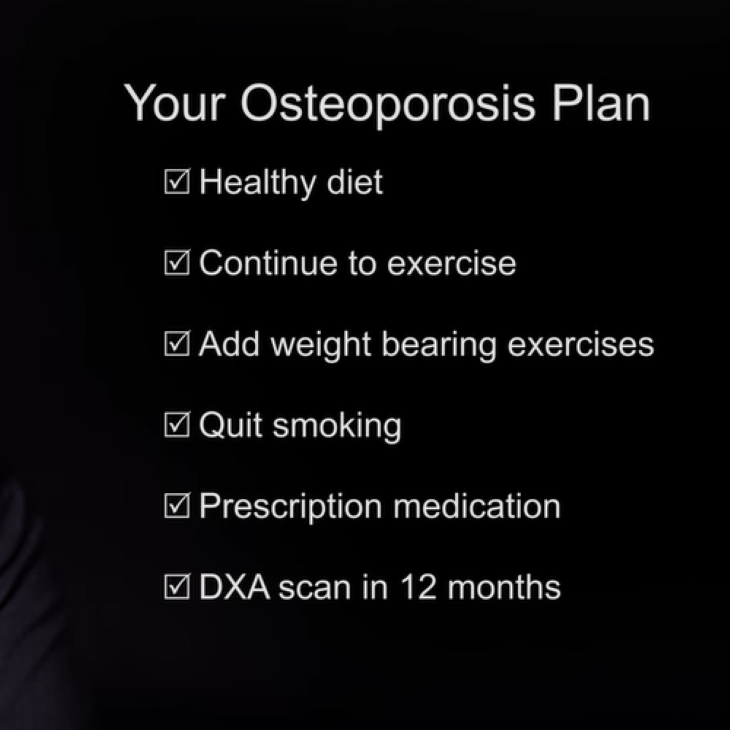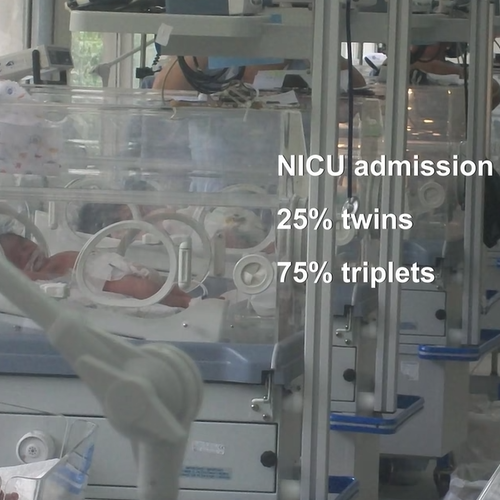
Causes of Male Infertility
Dr. Roger Lobo, of the American Society for Reproductive Medicine explains the causes of male infertility.
Transcript
Dr. Roger Lobo, of the American Society for Reproductive Medicine explains the causes of male infertility.
Hi I'm Dr. Roger Lobo with the American Society for Reproductive Medicine.
Today, we're talking about the causes of male infertility. Male infertility can be due to a variety of conditions. Some of these can be found and corrected while others cannot be corrected.
Most problems with male infertility occur when there are low numbers of sperm or abnormalities in their movement or shape. This can result from abnormalities in the production, transport, or delivery of sperm.
A varicocele is a common potentially correctable cause of male infertility. A varicocele is a collection of enlarged veins in the scrotum that can affect sperm production and its characteristics. Varicocele occurs in about 15% of all men and as many as 40% of those who are infertile. The tricky thing with that area is there are a lot of fertile men who are found with varicocele, so what do you do when you find a small one in an infertile male? This is when a male might first want to consult with a urologist before acting on taking care of a varicocele which sometimes might require surgery.
About 10 to 15% of men with low sperm counts have an abnormality in the Y chromosome which affects the development of sperm. Others may be born without critical parts of the sperm transport process, such as the vas deferens, which connect the testes to the male urethra.
Vasectomy is a common surgical cause of male infertility in men who have changed their minds about fertilization. But men who have had other surgery in or near the reproductive tract also can have problems. Injury to the nerve supply and/or obstructions in a transport system can affect sperm production.
For some men, fertility is affected by abnormal hormones, too. Too much estrogen and/or too little testosterone can negatively affect the development and maturation of sperm. Other hormones may be involved as well.
Temperature also plays a critical role. Sperm can only mature at temperatures lower than the core body temperature. This is why the testes normally lie in the scrotal sacs outside of the body. Heat exposure or conditions where the testes have not descended into the scrotum can affect sperm production.
Male infertility can also be due to infections, certain medical conditions, and exposure to toxins such as chemotherapy or radiation.
To learn more, check out our other videos on fertility, including the Basic Infertility Evaluation.
Videos
Resources For You

Advocacy Resources
ASRM has prepared resources to help you explain and advocate for reproductive rights and the continuation of in vitro fertilization and other fertility treatments.

Frequently Asked Questions
ASRM's Frequently Asked Questions (FAQ) provides answers to common questions about reproductive health.

Patient Journeys
ASRM has resources and publications to help you through each stage of your journey.

State and Territory Infertility Insurance Laws
One way that ASRM works to improve access to fertility care is by advocating for insurance coverage for reproductive medicine care. All patients should have access to the care they need.

Fact Sheets and Infographics
ASRM produces a series of fact sheets and booklets on various topics related to infertility, reproductive health, and family planning. The fact sheets and booklets are available in English, Spanish, and Chinese.

Reproductive Rights and You
The Dobbs decision has sparked a litany of changes in state laws across the nation, and more are expected. We need your help!

Reproductive Topics
Find all the resources on a specific topic compiled onto a single page.

SART Fertility Experts Podcast
An educational project of ASRM's affiliated society, the Society for Assisted Reproductive Technology (SART), this series is designed to provide up to date information about a variety of topics related to fertility testing and treatment such as IVF.

Patient Education Videos
ASRM and its affiliated society SART have made several videos to explain the sometimes difficult topics related to reproductive medicine.

Terms and Definitions
Find explanations for the meaning behind the doctor-speak you hear when trying to research reproductive medicine topics. ASRM has defined the most popular terms in easy to understand language.

Patient Stories
Read real-life stories from patients who have faced reproductive medicine challenges and come out stronger on the other side.

Fertility in the News
ASRM Press Releases and Bulletins are published by ASRM's Office of Public Affairs to inform the world about important happenings in reproductive medicine and at ASRM.
Infertility
SART Fertility Experts: Complimentary and Integrative Medicine in Reproductive Care and Infertility Treatment
Explore how acupuncture and naturopathic care support IVF, endometriosis, and fertility in this ASRM expert talk on integrative reproductive medicine. Listen to the EpisodeFrom Guidance to Global Impact: How ASRM’s Updated Definition of Infertility Helped Shape Policy in Australia
ASRM's updated infertility definition became a catalyst for regulatory action internationally and yielded new hope for growing families on the other side of the world. View the ArticleKey Abstracts Presented at the ASRM 2025 Scientific Congress & Expo
ASRM 2025 reveals support for IVF access, wildfire smoke's fertility risks, and how insurance mandates improve outcomes in reproductive health care.
Fertility and Sterility Publishes Editorial Exploring the Origins of “Restorative Reproductive Medicine” and Why Modern Fertility Care Must Remain Comprehensive
Restorative reproductive medicine overlooks IVF, male-factor care, and the need for full-spectrum fertility treatment using modern technologies.
ASRM PRIMED Cohort Members—Including Physicians, Providers, and Experts—Meet with Congressional Offices to Advocate for IVF Access & Educate About Realities of Restorative Reproductive Medicine
ASRM PRIMED cohort meets Congress to push for IVF access, clarify risks of restorative reproductive medicine, and defend science‑based fertility care.
ASRM Hosts Capitol Hill Briefing for Policymakers & Congressional Staff to Hear From Providers & Patients About Importance of IVF Access, Realities and Limitations of Restorative Reproductive Medicine
ASRM briefing united lawmakers, physicians & patients on IVF access, exposing RRM limits and urging policies to expand fertility care options.
SRS Warns Against Limiting Access to IVF Under the Guise of “Restorative” Care
SRS, an ASRM affiliate, advocates evidence-based reproductive surgery and full-spectrum fertility care for conditions like endometriosis, fibroids, and PCOS.
Fertility and Sterility Publishes Editorial Piece on How Restorative Reproductive Medicine Violates Reproductive Autonomy and Informed Consent
Editorial in Fertility and Sterility warns that Restorative Reproductive Medicine spreads stigma, delays care, and undermines IVF and patient autonomy.
F&S Reports Publishes Editorial Piece on the Unscientific Nature of the Arguments for “Restorative Reproductive Medicine” and Why We Need to Understand Them
F&S Reports editorial critiques “Restorative Reproductive Medicine” as unscientific, faith-driven, and a threat to evidence-based IVF care and reproductive rights.
ASRM Center for Policy and Leadership Releases Fact Sheet on Following the Science & An Evidence-Based, Science-Driven Response to Infertility
ASRM’s fact sheet outlines an evidence-based infertility care pathway, countering misleading RRM claims with science-backed medical best practices.
Follow the Science: An Evidence-Based, Science-Driven Response to Infertility
A science-based infertility evaluation and treatment guide, grounded in clinical best practices, counters ideologically driven alternatives like RRM. View the advocacy resourceASRM Ethics Committee Delivers New Opinion on Assisted Reproduction with Advancing Parental Age
ASRM Ethics Committee issues guidance on assisted reproduction and advanced parental age, addressing medical, ethical, and psychological considerations.
National Infertility Awareness Week
April 19-25, 2026, is National Infertility Awareness Week (NIAW)!
View the NIAW ToolkitSART Fertility Experts - Military Families and Fertility
Active-duty individuals in the military sometimes face unique circumstances when seeking fertility care. Learn more with a former military fertility physician. Listen to the EpisodeSART Fertility Experts - Q&A on Infertility
Infertility can create many questions for a patient. Listen to common questions and answers about infertility, egg freezing, and genetic testing. Listen to the EpisodeSART Fertility Experts - Environmental Impacts on Fertility
In this episode, the fertility experts discuss the impact of the environment, including air, climate, and chemical exposures on infertility. Listen to the EpisodeSART Fertility Experts - Recurrent Pregnancy Loss and Implantation Failure
"I can get pregnant, but I can't stay pregnant," is echoed by patients with recurrent pregnancy loss. Listen to the EpisodeSART Fertility Experts - Wellness and Fertility: Diet, Sleep and Exercise
Drs. Timothy Hickman and Rashmi Kudesia discuss the links between lifestyle and fertility. Listen to the EpisodeSART Fertility Experts - Navigating IVF as a Couple
Mary Casey Jacob, PhD is interviewed by Dr. Daniel Grow, and together they explore the emotional and practical support that couples need. Listen to the EpisodeMale Fertility Journey
About 20% of infertility cases are due to a male factor alone. Another 30% involves both male and female factors.
View the Patient JourneyFemale Fertility Journey
If you've been trying to get pregnant for more than a year, you may have infertility. Infertility is a disease of the reproductive system that impairs one of the body's most basic functions: the conception of children.
View the Patient JourneyStress and infertility
It is not clear how exactly stress impacts fertility. Read the Fact SheetHyperprolactinemia (High Prolactin Levels)
Prolactin is a hormone produced by your pituitary gland which sits at the bottom of the brain. Read the fact sheetOptimizing Natural Fertility
Before attempting pregnancy, a woman should make sure she is healthy enough for pregnancy by adopting a healthier lifestyle and taking prenatal vitamins. If she has a medical or genetic condition or risk of one, she should seek advice from a medical professional before conceiving (becoming pregnant) View the fact sheetOptimizing Male Fertility
About 20% of infertility cases are due to a male factor alone. Another 30% involves both male and female factors. View the fact sheetDefining Infertility
Infertility is “the inability to conceive after 12 months of unprotected intercourse.” View the Fact SheetFertility Rights and Responsibilities
Can a fertility program or clinic deny treatment to patient(s) if there is concern about the ability to care for the child(ren)? Yes. Fertility programs can withhold services if there are signs that patients will not be able to care for child(ren). View this Fact SheetMale Fertility Evaluation: What do I need to know?
Infertility is the inability to achieve pregnancy after one year of unprotected sex. View the fact sheetSmoking and infertility
Most people understand that smoking increases the risk for heart, vascular, and lung disease. View the fact sheetWhat are fibroids?
Uterine fibroids (also called myomas or leiomyomas) are benign (noncancerous) tumors of muscle tissue found in the uterus. View the fact sheetInfertility Counseling and Support: When and Where to Find It
Infertility is a medical condition that touches all aspects of your life. View the fact sheetWhat is In Vitro Maturation (IVM)?
In vitro maturation (IVM) is when a woman’s eggs are collected and matured outside the body. This is done as part of an in vitro fertilization (IVF) procedure. View the fact sheetİn Vitro Maturasyon (IVM)
İn vitro maturasyon (IVM), yumurtaların vücut dışında toplanıp olgunlaştırılması işlemidi. View the fact sheetİnfertilite İçin Tanısal Testler
Gebelik elde edememiş çiftlere, korunmasız şekilde 12 ay boyunca denemelerine rağmen gebe kalamamışlarsa fertilite testleri önerilmektedir. View the fact sheetKISIRLIĞIN (İNFERTİLİTENİN) TANIMLANMASI
Kısırlık “12 aylık korunmasız ilişkiye karşın gebe kalamamadır. View the fact sheetSigara ve Kısırlık
Çoğu insan, sigara içmenin kalp, damar ve akciğer hastalıkları riskini artırdığını bilir. View the fact sheetSART Fertility Experts - Endometriosis
Endometriosis is a condition that can affect many facets of a person’s life, from pelvic pain to struggles with infertility. Listen to the EpisodeSART Fertility Experts - Recurrent Pregnancy Loss
Candace discusses her experience with infertility, IVF, multiple pregnancy losses and ultimately a successful delivery with Dr. Julia Woodward.Listen to the Episode
SART Fertility Experts - Financial Aspects of Infertility Treatment
“I know what treatment I want and need to do, but how can I afford it?” This is a common question infertility patients often ask themselves. Listen to the EpisodeSART Fertility Experts - Infertility Advocacy and Government Affairs
In today's episode, Dr. Mark Trolice interviews Sean Tipton about the fact that many infertility patients do not have insurance coverage for treatment. Listen to the EpisodeSART Fertility Experts - Your Infertility Nurse: Partner in Your Care
Infertility nurse practitioner and health coach Monica Moore explains the essential role of the infertility nurse in the IVF process. Listen to the EpisodeIntracytoplasmic sperm injection (ICSI)
A procedure called intracytoplasmic sperm injection (ICSI) can be done along with in vitro fertilization (IVF) if a sperm cannot penetrate the outer layer of an egg. Read the Fact SheetSART Fertility Experts - IVF: Cycles of Hope and Heartbreak
Does stress cause infertility or is it the other way round? Listen to the EpisodeSART Fertility Experts - RESOLVE and Infertility
Due to the unique stress of infertility, patients often look for resources and support in addition to those provided by their medical provider. Listen to the EpisodeWhat is Recurrent Pregnancy Loss (RPL)?
This is a condition when a woman has 2 or more clinical pregnancy losses (miscarriages) before the pregnancies reach 20 weeks. View the fact sheetSaline infusion sonohysterogram (SHG)
Saline infusion sonohysterography (SIS or SHG) is aprocedure to evaluate the uterus and the shape of the uterine cavity. View the fact sheetTestosterone use and male infertility
Testosterone (also referred to as “T”) is a hormone produced in men by the testes (testicles). View the fact sheetWhat is Premature Ovarian Insufficiency (Previously Called Premature Ovarian Failure)?
When a woman’s ovaries stop working before age 40, she is said to have premature ovarian insufficiency (POI). View the fact sheetSART Fertility Experts - Safe Surfing: The Pros and Perils of Social Media
Dr. Kenan Omurtag, MD joins host Dr. Mark Trolice to discuss the use of social media in the field of infertility. Listen to the EpisodeSART Fertility Experts - What is an REI?
These experts in infertility lead IVF programs, perform reproductive surgery, and perform research to enhance the field of reproductive medicine. Listen to the EpisodeSART Fertility Experts Teaser
Stress and Infertility
Medical procedures, cost, outcome uncertainty, and unwanted or unhelpful advice from friends and family are stressors associated with infertility treatment. Watch VideoInfertility: an Overview (booklet)
Infertility is typically defined as the inability to achieve pregnancy after one year of unprotected intercourse. View the bookletMale Fertility and Infertility - a patient education video
Male Factor Infertility is responsible for about 30% of infertility cases and can contribute infertility to an additional 20% of cases. Watch VideoInfertility
Infertility is the result of a disease (an interruption, cessation, or disorder of body functions, systems, or organs) of the male or female reproductive tract which prevents the conception of a child or the ability to carry a pregnancy to delivery. Watch VideoBasic Infertility Evaluation
Dr. Roger Lobo of the American Society for Reproductive Medicine discusses the various methods to evaluate infertility. Watch VideoFibroid Tumors
An educational video that answers patient questions about the causes, symptoms, diagnosis and management of uterine fibroids. Watch VideoInfertility Treatments
Dr. Roger Lobo of the American Society for Reproductive Medicine discusses the various treatments for infertility. Watch VideoSurviving the Roller Coaster Emotions of Infertility Treatment
The experience of infertility is a rollercoaster of hope and disappointment. Treatment presents an opportunity for hope as well as a new set of challenges. Watch VideoSexual dysfunction and infertility
Sexual dysfunction is a problem in a person’s sexual desire, arousal, or orgasm. View the fact sheetCoping With Infertility
Dr. Roger Lobo of the American Society for Reproductive Medicine discusses various methods of coping with infertility. Watch VideoEndometriosis
Endometriosis is a condition in which endometrial tissue, which normally lines the uterus, develops outside of the uterine cavity in abnormal locations. Watch VideoCauses of Female Infertility
Dr. Roger Lobo, of the American Society for Reproductive Medicine explains the causes of female infertility. Watch VideoAge and Fertility (booklet)
Generally, reproductive potential decreases as women get older, and fertility can be expected to end 5 to 10 years before menopause. View the BookletCauses of Male Infertility
Dr. Roger Lobo, of the American Society for Reproductive Medicine explains the causes of male infertility. Watch VideoFAQ About Infertility
Infertility is not an inconvenience; it's a disease of the reproductive system. Learn the factsFAQ About the Psychological Component of Infertility
Infertility often creates one of the most distressing life crises that a couple has ever experienced together. Learn the factsMary Dolan's Story
Infertility Infographics
ASRM has prepared infographics to illustrate the subject of Infertility better. View the infographicsMale Fertility/Andrology
SART Fertility Experts - Azoospermia
Learn about azoospermia, its causes, diagnosis, and treatment options from top fertility experts. Early testing is key to effective infertility care. Listen to the EpisodeSART Fertility Experts - Wellness and Fertility: Diet, Sleep and Exercise
Drs. Timothy Hickman and Rashmi Kudesia discuss the links between lifestyle and fertility. Listen to the EpisodeMale Fertility Journey
About 20% of infertility cases are due to a male factor alone. Another 30% involves both male and female factors.
View the Patient JourneySART Fertility Experts - Urology and Male Reproductive Health
Stress and infertility
It is not clear how exactly stress impacts fertility. Read the Fact SheetOptimizing Natural Fertility
Before attempting pregnancy, a woman should make sure she is healthy enough for pregnancy by adopting a healthier lifestyle and taking prenatal vitamins. If she has a medical or genetic condition or risk of one, she should seek advice from a medical professional before conceiving (becoming pregnant) View the fact sheetOptimizing Male Fertility
About 20% of infertility cases are due to a male factor alone. Another 30% involves both male and female factors. View the fact sheetCancer and its impact on sperm, cryopreservation, and fertility
This can be confusing since the terms are often used interchangeably in the media and casual conversation. View the fact sheetMale Fertility Evaluation: What do I need to know?
Infertility is the inability to achieve pregnancy after one year of unprotected sex. View the fact sheetSperm morphology (shape): Does it affect fertility?
The most common test of a man’s fertility is a semen analysis. View the fact sheetFertility Options for Men with Spinal Cord Injury
There are several reasons a man with a spinal cord injury (SCI) might have infertility. View the fact sheetVaricocele
A varicocele is a variation of normal anatomy in which veins in the scrotum (the sac that holds the testicles) become enlarged and sometimes even visible. View the fact sheetWeight and fertility
One of the easiest ways to determine if you are underweight or overweight is to calculate your body mass index (BMI). View the fact sheetERKEK FERTİLİTESİNİN OPTİMİZASYONU
Normal bir heteroseksüel çiftin bir yıl içinde hamile kalma şansı yaklaşık %85’tir. View the fact sheetERKEK KANSERİ DONDURARAK SAKLAMA VE DOĞURGANLIK
Terimler genellikle medyada ve gündelik konuşmalarda birbirinin yerine kullanıldığı için bu kafa karıştırıcı olmakla birlikte bu iki terim birbirinden oldukça farklıdır. View the fact sheetERKEKTE KISIRLIĞIN DEĞERLENDİRİLMESİ
Kısırlık, bir yıl boyunca korunmasız cinsel ilişkiye rağmen gebelik elde edilememesi olarak tanımlanır. View the fact sheetİnfertilite İçin Tanısal Testler
Gebelik elde edememiş çiftlere, korunmasız şekilde 12 ay boyunca denemelerine rağmen gebe kalamamışlarsa fertilite testleri önerilmektedir. View the fact sheetKilo ve Doğurganlık
Gebelik için ideal kiloda olup olmadığınızı anlamanın en kolay yollarından biri, vücut kitle indeksinizi (VKİ) hesaplamaktır. View the fact sheetVarikosel
Varikosel, skrotumda (testisleri tutan torba) bulunan damarların genişlemesidir. View the fact sheetSART Fertility Experts - Male Factor
Intracytoplasmic sperm injection (ICSI)
A procedure called intracytoplasmic sperm injection (ICSI) can be done along with in vitro fertilization (IVF) if a sperm cannot penetrate the outer layer of an egg. Read the Fact SheetSART Fertility Experts - IVF: Cycles of Hope and Heartbreak
Does stress cause infertility or is it the other way round? Listen to the EpisodeFertility Options After Vasectomy
Vasectomy is currently one of the most common methods of sterilization in the United States. After your vasectomy, if you change your mind about having children, there are two procedures that can help you have a child with your partner. View the Fact SheetTestosterone use and male infertility
Testosterone (also referred to as “T”) is a hormone produced in men by the testes (testicles). View the fact sheetSART Fertility Experts - Male Fertility
Did you know that up to 40% of infertile couples suffer from male factor infertility? Listen to the EpisodeInfertility: an Overview (booklet)
Infertility is typically defined as the inability to achieve pregnancy after one year of unprotected intercourse. View the bookletMale Fertility and Infertility - a patient education video
Male Factor Infertility is responsible for about 30% of infertility cases and can contribute infertility to an additional 20% of cases. Watch VideoInfertility
Infertility is the result of a disease (an interruption, cessation, or disorder of body functions, systems, or organs) of the male or female reproductive tract which prevents the conception of a child or the ability to carry a pregnancy to delivery. Watch VideoBasic Infertility Evaluation
Dr. Roger Lobo of the American Society for Reproductive Medicine discusses the various methods to evaluate infertility. Watch VideoInfertility Treatments
Dr. Roger Lobo of the American Society for Reproductive Medicine discusses the various treatments for infertility. Watch VideoUnderstanding Fertility
In this video series, Dr. Roger Lobo explains the basics of infertility, including causes, treatments and coping methods. Watch VideoSurviving the Roller Coaster Emotions of Infertility Treatment
The experience of infertility is a rollercoaster of hope and disappointment. Treatment presents an opportunity for hope as well as a new set of challenges. Watch VideoCauses of Male Infertility
Dr. Roger Lobo, of the American Society for Reproductive Medicine explains the causes of male infertility. Watch VideoFAQ About Infertility
Infertility is not an inconvenience; it's a disease of the reproductive system. Learn the factsMale Fertility Infographics
ASRM has prepared infographics to illustrate the subject of Male Fertility better. View the infographicsFind a Health Professional
























